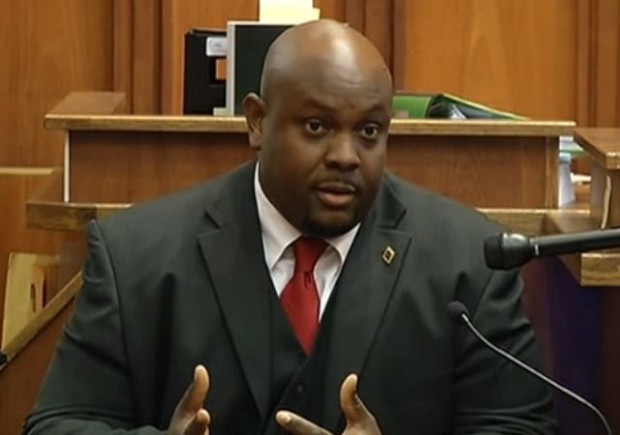Florida prosecutors fail in effort to deny self-defense immunity to black male shooter

The Miami Herald is reporting that the Florida Supreme court has declined to hear state prosecutor’s final appeal of self-defense immunity awarded to a black Floridian who shot and killed two Hispanic men in self-defense: “State high court won’t hear appeal in Miami self-defense case” (h/t Miguel over at GunFreeZone.net).
This decision by the State’s highest court ends prosecutorial efforts to convict and imprison Gabriel Mobley. It also sheds some interesting light on the process for self-defense immunity in Florida. (Many states have self-defense immunity laws, but their procedures for granting immunity vary wildly from state to state.)
We previously covered the Mobley case back in January right here at Legal Insurrection, “FL Appellate Court Grants Self Defense Immunity To Black Defender,” noting then that:
The evening of February 27, 2008, in the Miami area, Gabriel Mobley and a friend were viciously attacked by two men. Using his licensed concealed carry pistol, Mr. Mobley successfully fought off the attack, killing both of the aggressors. He was charged with two counts of second degree murder – murder which, under Florida law, requires “malice”.Mobley exercised his rights under Florida’s self-defense immunity state, 776.032 Immunity from criminal prosecution and civil action for justifiable use of force, to avoid going to trial on the basis that it was more likely than not, based on the evidence, that he acted in lawful self-defense.The trial judge, Thomas Rebull, refused to dismiss the charges. He claimed that Mobley’s testimony was not credible, and that Mobley’s deadly force was “neither reasonable or necessary.” Mobley appealed.On Thursday, the Florida appellate court hearing the matter ruled by 2-1 that the evidence supported Mobley’s request for self-defense immunity. (The State prosecutors say they intend to appeal that ruling.)
This past week the State’s prosecutors’ efforts on that appeal achieved their final failure, when the FL Supreme Court issued an order declining to hear the matter. (That earlier post includes a comprehensive retelling of the facts of the case.)
As we’ve all long come to expect from mainstream media “news” (see “Murray Gell-Mann Amnesia effect”), the cited Miami Herald article hopelessly confuses two utterly distinct legal doctrines, “Stand-Your-Ground” and self-defense immunity. These two doctrines effectively have nothing to do with one another. Some states have “Stand-Your-Ground,” others have self-defense immunity, some have both, some have neither. TWO DIFFERENT THINGS. (For a fairly thorough explanation of this, see the Law of Self Defense University video/podcasts #001 on “Stand-Your-Ground” and #003 on self-defense immunity.)
Miguel at gunfreezone.net notes in his blog post an almost humorous part of this case, given Florida’s recent legislative history: One of the reasons the lower trial court had denied Mobley’s claim to self-defense immunity was because the judge believed it would have been more appropriate for him to fire a “warning shot.” As noted by the 3d DCA decision that reversed that lower court denial and granted Mobley self-defense immunity:
Here, the court below determined that Mobley did not “reasonably” believe that deadly force was “necessary” to prevent “imminent” death, great bodily harm, or commission of a forcible felony. In doing so, the court discounted the totality of the circumstances facing Mobley and concluded that the use of deadly force was not reasonable, first, because Mobley “never saw a weapon and did not know anything about the possibility of a weapon,” with him only seeing “the second attacker appear to be reaching for something under his shirt,” and second, because Mobley should have brandished his gun, fired a warning shot or told the attackers to stop because he had a gun. (emphasis added)
Later Florida courts would receive defendants who had done precisely as Mobley’s trial judge recommended, while lacking the reasonable belief that deadly force was necessary to prevent imminent death, great bodily harm, or commission of a forcible felony that his trial judge claimed, and been convicted and subjected to horrifically long prison sentences under Florida’s infamous “10-20-Life” mandatory sentencing scheme.
Such cases were the impetus behind Florida’s recently adopted so-called “warning shot” bill, which the state’s Governor signed into law just days ago.
–-Andrew, @LawSelfDefense
P.S. I’m pleased to announce that the National Rifle Association–where I have been a Life Member and Instructor for more than 20 years–has informed me this week that they will begin stocking “The Law of Self Defense, 2d Edition” in the NRA Store. Inventory should be in place by the end of the month or so. 🙂
Andrew F. Branca is an MA lawyer and the author of the seminal book “The Law of Self Defense, 2nd Edition,” available at the Law of Self Defense blog (autographed copies available) and Amazon.com (paperback and Kindle). He holds many state-specific Law of Self Defense Seminars around the country, and produces free online self-defense law educational video- and podcasts at the Law of Self Defense University.
CLICK HERE FOR FULL VERSION OF THIS STORY